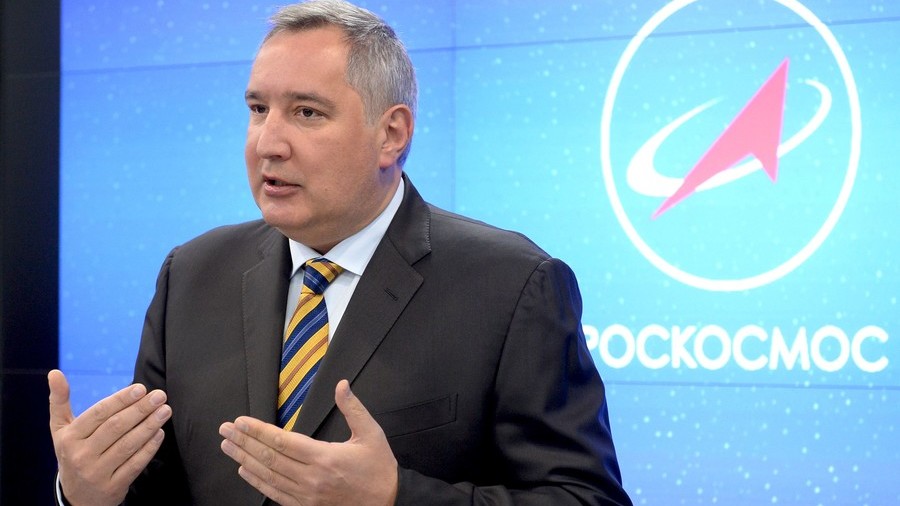
Major US sanctions on Russia in the past decade have lead the Russian space agency director to threaten restrictions on NASA and astronauts. These comments led NASA officials to doubt Russia’s commitment to maintain their necessary operations on the International Space Station (ISS). To secure the future of the ISS, NASA and the US aerospace industry have had to respond with innovation to develop replacements and alternatives.
Dmitry Rogozin, the outspoken head of the Russian space agency, Roscosmos, has been known to go on lengthy, tangent-filled rants on Twitter or state television, usually including threats to the US space program. In 2014, after US sanctions on Russia were announced following their invasion of Ukraine, Rogozin threatened the US presence on the ISS by refusing to launch our astronauts on Russian rockets, the only method at the time. He tweeted (1), suggesting we use a trampoline to get to orbit. This huge threat warranted the development of a new US-based crew launch program, and later that year, SpaceX announced the development of their crew vehicle, the Crew Dragon. In 2021, at the press conference following the first successful launch of the completed Crew Dragon, head of SpaceX, Elon Musk, quipped, “the trampoline is working,” acknowledging Rogozin’s threat as a major driving force for SpaceX’s development in this sector.
In 2021, Russia lost their monopoly on crew transportation to and from the ISS when SpaceX delivered their Crew Dragon alternative for ISS crew transport. Russia’s main income stream from the ISS was the $80M ticket paid routinely by NASA for all astronauts. With their earnings slashed, Russia quickly began to distance themselves from ISS project. Later in the year, when other international space agencies committed to supporting the ISS until 2030, Russia only committed until 2024, citing increased maintenance and crew safety as the main reasons.
Russia’s early departure will be a huge blow to the ISS: losing necessary maintenance systems, possibly the entire Russian segment of the station, and crew and cargo docking and transportation sections. One key role Russia has in the operation of the ISS is in the reboost: the periodic rocket thrust that keeps the ISS in orbit. About once a month, the ISS needs a nudge back up into space to maintain its orbit, otherwise it will literally fall out of the sky in about 6 months (2). The 2024 deadline gives other agencies time to develop replacement spacecraft and procedures. This isn’t all bad, as new technologies are usually developed along the way. Although ideally this wouldn’t be necessary, Russia entered into the ISS project in a spirit of cooperation and backing out early from loss of financial gain is a selfish decision for such an high-profile joint project.
More recently, the announcement of new US sanctions on Russia lead to tweets and an announcement on Russian state television that included threats of real danger by Rogozin (3). “If you block cooperation with us, who will save the ISS from an uncontrolled deorbit and fall into the United States or Europe? There is also the option of dropping a 500-ton structure to India and China. Do you want to threaten them with such a prospect? The ISS does not fly over Russia, so all the risks are yours.” – Rogozin
This behavior has reminded NASA and others to maintain their speedy development of ISS system replacements. Northrop Grumman, one of NASA’s top private contractors, has been developing systems for reboost and actually performed a successful test in January of this year. Despite Rogozin’s recent threat of dropping the ISS on their enemies, these recent reboost tests demonstrate the control the US has over the space station. The ISS is actually safe from Rogozins threats thanks to his own unreliable behavior in the past–pushing the US to develop independent control options.
Another NASA contractor, United Launch Alliance (ULA), has used Russian rocket engines on their extremely popular Atlas V rockets since 2002. Anticipating hostility from Russia, ULA decided to retire their very successful family of rockets, avoiding the possibility of promising rockets without engines, and paving the way for their new line of rockets, unreliant on Russian technology. Unsurprisingly, one of Rogozin’s announcements this week was the end of service of rocket engines by Russian suppliers, including those of the Atlas V. We’ll have to see if the last few on the schedule get launched, or if those payloads will have to be modified to be launched in other rockets.
Decreasing cooperation and increasing hostility from Rogozin over the last 10 years has forced NASA, SpaceX, Northrop Grumman, ULA, and others to develop alternatives to perfectly good Russian systems. Although this led to innovation and more security for the US space program, it also lead to independence that strays from the goal of the definitively collaborative, international efforts on the International Space Station.

That was a very interesting read! I had no idea that International Space Station has to be nudged back into space, and Russia is currently the only country that can do that at the moment. That is honestly very scary especially since they only agreed to do this until 2024 and they can just let this fall onto earth. Space is so interesting and it is unclaimed which forces countries to work together to a degree–i’m interested to see how this plays out in the next couple years with everything that is going on right now.
It’s really a shame to see something like the ISS be used as a political bargaining chip since it’s usually a great example of what we can accomplish by looking past petty national identities and cooperating for the sake of all of humanity. I hope it remains an international project into the future even if Russia decides to cease cooperation for that reason especially.
I wouldn’t have expected a threat like dropping the ISS on your enemies- wow! The remarks by Rogozin seem unhinged and nonsensical, not something suited to the head of the Russian space agency. Pulling out of such a monumental project because of politics back on Earth seems petty and unproductive for everyone involved, even if they can no longer charge exorbitantly high fees for US astronauts. It seems like keeping the ISS functioning and in orbit is in the best interest of everybody, not just whoever can make money off of it.